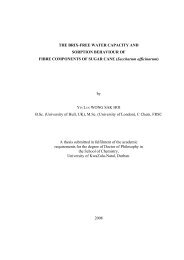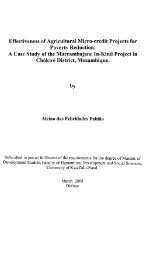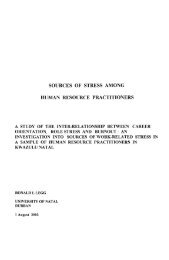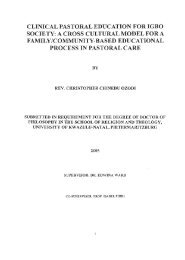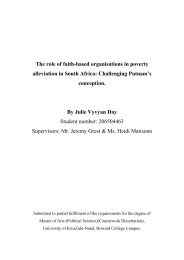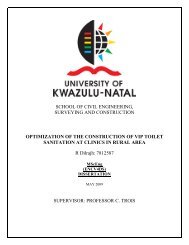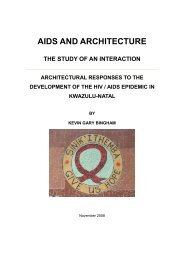View/Open - ResearchSpace - University of KwaZulu-Natal
View/Open - ResearchSpace - University of KwaZulu-Natal
View/Open - ResearchSpace - University of KwaZulu-Natal
You also want an ePaper? Increase the reach of your titles
YUMPU automatically turns print PDFs into web optimized ePapers that Google loves.
on the government, NGOs, donors/funder for resources and this hinders their proper function.<br />
This suggests the need for the government to consider infection control practices in HBC as<br />
important as those in the hospitals.<br />
There is need for the government to involve HBCOs in developing strategies <strong>of</strong> dealing with<br />
challenges regarding infection control practices.<br />
Meso level<br />
On the community level, a study conducted in South Africa by Akintola (2006:12) on sources<br />
and the nature <strong>of</strong> support that volunteers received, findings revealed that some volunteer<br />
carers received support from community leaders and councillors in raising awareness. Family<br />
members <strong>of</strong> the patient and other community members had positive attitudes towards them<br />
and PLWHA; they helped in assisting carers to do their work such as bathing the patients. On<br />
the contrary, volunteer caregivers in this study did not receive support from some family<br />
members and some community members. For example, due to stigma some patients were<br />
hidden in their rooms, beaten for soiling themselves, denied food and denied access to<br />
volunteer caregivers. Some were abandoned and this caused more burdens <strong>of</strong> care work for<br />
the volunteer caregivers.<br />
Additionally, volunteer caregivers were ridiculed by their family and some community<br />
members because <strong>of</strong> the nature <strong>of</strong> the work. Issues <strong>of</strong> stigma on the patients and ridiculing <strong>of</strong><br />
volunteer caregivers pose threats to volunteer care giving work and has a negative impact on<br />
infection control practices in that volunteer caregivers will have limited access to patients;<br />
there will be high HIV/AIDS morbidity and mortality rates among PLWHA in HBCOs; there<br />
could be more burdens <strong>of</strong> care on volunteer caregivers resulting in more stress and HBCOs<br />
and the government could fail to meet its objectives <strong>of</strong> managing the HIV/AIDS pandemic.<br />
The findings <strong>of</strong> this study suggest that there might be a link with the findings <strong>of</strong> two<br />
different studies, one performed in South Africa (Akintola, 2008) and another in Botswana<br />
(Kang’ethe, 2010). These studies revealed that most caregivers did not receive support from<br />
community members due to stigma and this caused them to be stressed. The findings <strong>of</strong> this<br />
study also adds new knowledge on what could hinder proper infection control practices in<br />
67




